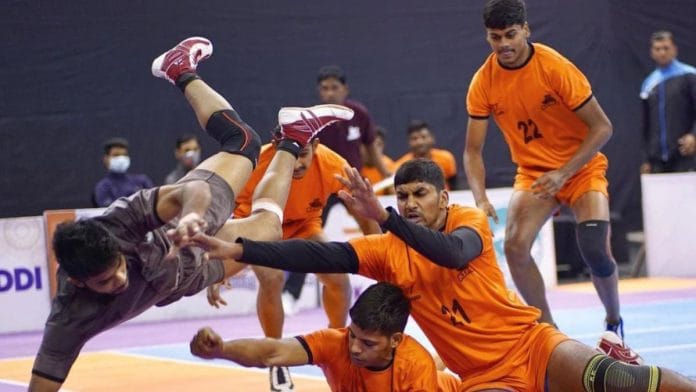New Delhi: The response to the Centre’s ambitious ‘Bharatiya Khel’ initiative, aimed at promoting indigenous sports in schools, has been disappointing in the two years since its launch, with only 1,500 schools having registered so far, ThePrint has learnt.
Home Minister Amit Shah had launched the programme on 29 July 2022, the second anniversary of the National Education Policy (NEP) 2020, as part of the government’s Indian Knowledge System (IKS) initiative. Its objective is to introduce students to Indian games, especially in rural areas that often lack the infrastructure for popular games such as basketball or badminton.
In a country with around 15 lakh schools, only 1,500 schools have so far registered for the programme, according to data with the IKS division of the Ministry of Education.
Part of the reason could be lack of awareness as well as enthusiasm among students, with officials at various schools pointing out to ThePrint that the programme does not offer students any monetary rewards. The division is now considering reforms.
“Participation is much lower than we had expected. We are trying to rethink our strategy. We don’t want to use our time and resources in a direction where it is not bringing any results. We want to do meaningful and impactful work,” Ganti S. Murthy, national coordinator for IKS, told ThePrint.
Also Read: ‘Treated like criminal’ — Safoora Zargar denied MPhil thesis extension, Jamia says 3 already given
The programme
Shortly after launching the programme, the ministry had released a list of 75 indigenous games including ‘raja mantri chor sipahi’, ‘posham pa’, ‘gilli danda’, ‘yubi lakpi’, different forms of ‘kabbadi’, ‘langdi’ (hopscotch), javelin throw, ‘patang uddayan’ (kite-flying), ‘seeta uddhar’ (prisoner’s base), ‘mardani khel’ (a form of martial arts), ‘vish amrit’ and ‘Santhal katti’ a version of ‘gilli danda’ played by the Santhal tribe.
The IKS division had also released a detailed implementation plan, under which each school would nominate a person, most likely the teacher responsible for physical activities, as the point of contact. These teachers would be trained by IKS and prepare their students to play the games. Schools would then upload videos of participation, which would be assessed by a team of IKS-appointed experts, followed by certificates of recognition.
Each month, the division announces a “game of the month” to be played by students in participating schools. For instance, according to the IKS website, kabaddi is the game of the month for October 2024.
The idea was not just to promote Indian games in schools but to help participating students feel connected to their roots, Murthy said.
The response
School principals contacted by ThePrint mentioned lack of information and interest among students.
Brij Mohan, principal of a government high school in Baghpat, said the programme was not being promoted well enough. “We don’t know much about it, and we lack the resources to upload all the videos online. Had it been an offline competition, more schools might have participated,” he told ThePrint.
The principal of a CBSE-affiliated private school in Delhi said the absence of monetary benefits was a major reason for the low participation. “Other government schemes such as the Khelo India Youth Games offer awards, cash prizes and scholarships, which motivate both schools and students to engage more actively,” the principal said, requesting anonymity.
“Besides, there has to be some annual national competition specifically for these games so that students have something to look forward to,” the principal added.
The rethink
Sangeeta Goswami, an expert on indigenous games and coordinator of the programme, said organising events offline is indeed being discussed. “We’ve learned from schools in rural areas that they lack the resources to upload videos. Additionally, schools have questioned why they should join without any monetary incentives,” she said.
She said the division would require substantial funding to conduct offline programmes.
“We are re-evaluating our programme and seeking CSR (corporate social responsibility) funding to organise events in major cities. We are also looking for a budget for digital marketing and broader publicity. We may come up with some changes in the coming months,” she said.
(Edited by Radifah Kabir)
Also Read: Jamia Millia Islamia to adopt CUET for admission into 8 undergraduate courses for 2022-23






